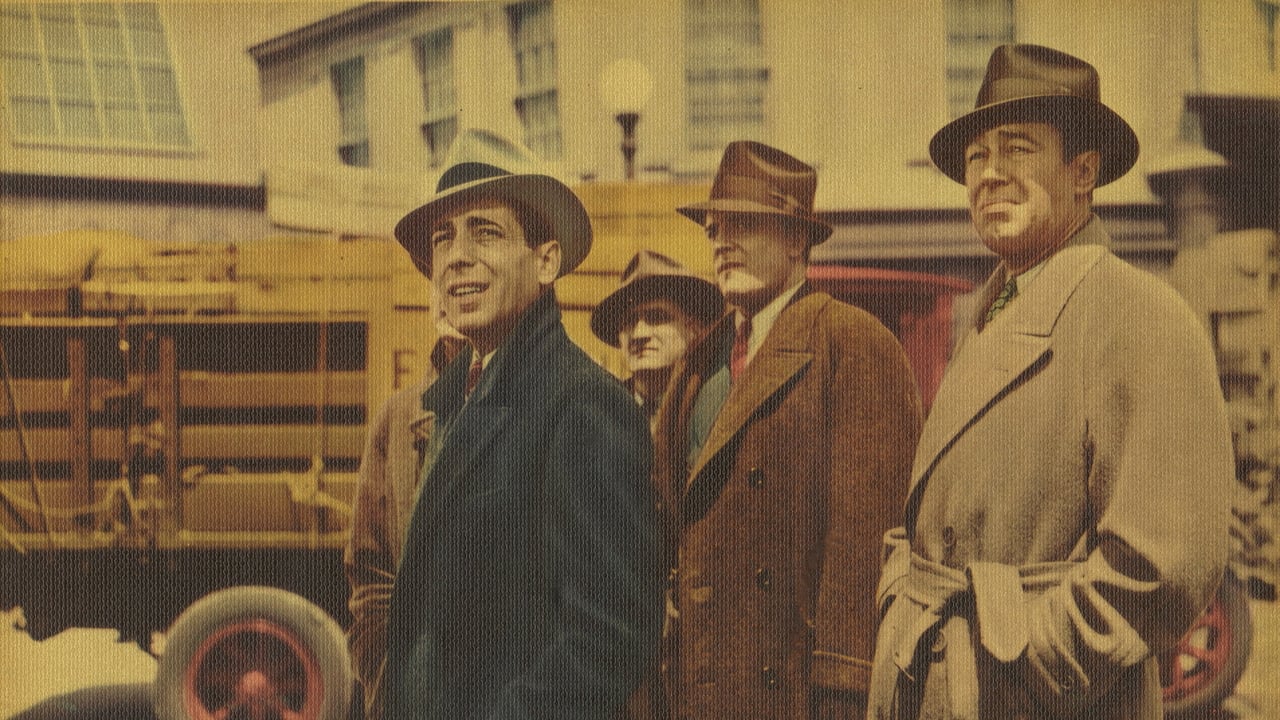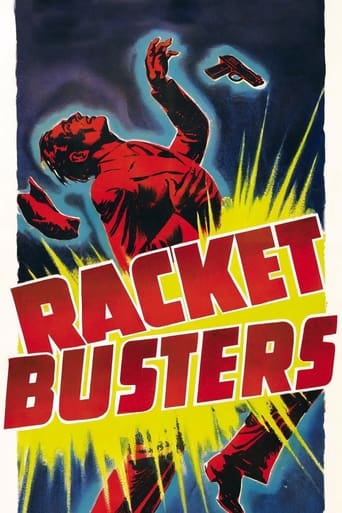



Am I Missing Something?
Blending excellent reporting and strong storytelling, this is a disturbing film truly stranger than fiction
View MoreAll of these films share one commonality, that being a kind of emotional center that humanizes a cast of monsters.
View MoreThis is a small, humorous movie in some ways, but it has a huge heart. What a nice experience.
View MoreHumphrey Bogart (Martin), George Brent (Denny Jordan), Allen Jenkins (Skeets), Gladys Dickson (Nora Jordan), Walter Abel (Allison), Penny Singleton (Gladys), Henry O'Neill (governor), Oscar O'Shea (Pop), Anthony Averill (Dave Crane, Martin's chief henchman), Eliott Sullivan (Charlie Smith), Fay Helm (Mrs Charlie Smith), Joe Downing, Norman Willis, Ethan Laidlaw, James Pierce, Harry Tenbrook (Martin henchmen), Robert Strange (Martin's lawyer), Don Turner, Dick Wessel, Jimmy O'Gatty, Paul Panzer, George Lloyd, Bob Perry, Dick Rich, Lew Harvey, Jack Kenny, Joe Devlin, Alan Davis, Eddy Chandler, Glen Cavender (truck drivers), Irving Bacon (counter man), Egon Brecher (Peters), Cecil Weston, Jean Maddox, Loia Cheaney (angry women), Nat Carr, Harvey Clark, Harrison Greene (merchants), Dale Van Sickel (special officer), Monte Vandergrift (detective), Charles Trowbridge (judge), Edwin Stanley (doctor), Cliff Saum (policeman), Jack Mower (plainclothesman), John Ridgely (Yellow Stripe truck driver), Wedgwood Nowell (businessman), James Nolan (Allison's secretary), Harry Myers (court stenographer), Bruce Mitchell (deputy), Vera Lewis (Jordan's neighbor), Georgie Cooper (woman on subway platform), Mary Currier (Mrs Allison), William B. Davidson (Manhattan Trucking chairman), Joe De Stefani (proprietor), John Dilson (Robbins), Jack Gardner (gas station attendant), William Gould (police sergeant), Jack A. Goodrich (clerk), John Harron (Allison's stenographer), Gordon Hart (minister), Herbert Heywood (gas station owner), Stuart Holmes (Vic Thompson, a cleaner), Jan Holm (sanitarium nurse), Paul Irving (John H. Herbert), Frank Jaquet (City Hospital doctor), Jack Wise (cashier).Director: LLOYD BACON. Screenplay: Robert Rossen, Warren Duff. Story: Robert Rossen, Leonardo Bercovici. Treatment: Mark Hellinger. Photography: Arthur Edeson. Film editor: James Gibbon. Art director: Esdras Hartley. Costumes designed by Howard Shoup. Music composed by Adolph Deutsch, orchestrated by Hugo Friedhofer, directed by Leo F. Forbstein. Assistant director: Richard Maybery. Sound recording: Robert B. Lee. Producer: Samuel Bischoff. Executive producer: William Randolph Hearst.Copyright 1 June 1938 by Warner Brothers Pictures, Inc. A Cosmopolitan Production. New York opening at the Strand: 10 August 1938. U.S. release: 16 July 1938. Australian release: 22 September 1938. 71 minutes. SYNOPSIS: The underworld tries to muscle in on the trucking industry.COMMENT: Despite its rich production values with loads of extras milling around seemingly authentic locations, we know this is a program picture, because it has no stars billed above the title. None! Not even Bogart, who is billed first. His star had not yet risen. (Here he plays the typical 1930s gangster. Almost a caricature, if it wasn't so sinisterly menacing). Nor George Brent. His star was fading. (His portrayal comes over as lively and vigorous enough, but lacks the charm he brought to his earlier roles). Nor Penny Singleton. Her life as Blondie didn't begin until November, 1938. (This is one of her best performances and probably inspired her later real-life work smashing graft and breaking up underworld influence in the entertainment industry). The other main player, Allen Jenkins, rarely received above-the-title billing. Here, he convincingly handles a more serious part than usual, albeit with comic overtones. Mind you, the script is the work of Robert Rossen. Powerful enough, though it offers little that seems original or especially striking. It's director Lloyd Bacon (normally a rather humdrum type) who unexpectedly gives the movie a lift. Not only are the action scenes vividly staged, but even some dialogue exchanges are delivered at a pleasing run in front of a fast-tracking camera. With the director in this rare inventive mood (maybe he was inspired by the brilliant cameraman Arthur "Casablanca" Edeson), and lots of money to throw around, "Racket Busters" emerges as a fast-paced exposé. Brisk editing also helps.
View More**SPOILERS** With his paid-off politicians and judges now swept into office big time mobster John "Czar" Martin, Humphrey Bogart, doubled his efforts to take over the trucker's union. It's the hard working and take no BS truckers that were still independent of Martin and his mob.Terrorizing most of the truckers into to joining his union, and kick back half their salaries to it, Martin hit a roadblock in tough and independent minded teamster Denny Jordan, George Brent. Denny saw Martain for the cheap and cowardly hoodlum that he really was and refused to be intimidated by him. That's until Denny lost his trucking business, by Martin's hoods putting the torch to it, and having his wife Nora, Gloria Dickson, end up with a sanitarium with a nervous breakdown because of it. With the governor appointed Special Persecutor Hugh Allison, Walter Able, looking to put Mattin and his organization out of business and behind bars Denny was the man he hoped, by turning evidence against Martin, to help him do it. As things turned out Danny in him not wanting to be a rat, or informer, even against a murderous thug like Martin decided to play it safe and not go before a Special Grand Jury and tell it of Martin's shake down and strong-arm activities. That in fact gave Martin a free hand to do anything he wanted to without fear of the law!What Martin wanted was to control the city's food supply with the truckers refusing to truck in any goods of the members of the food or produce industry who refuse to kick back to him. Not really caring about the truckers or their families but only using them for his own criminal purposes it became evident to former union chief Pop Wilson, Oscar O'Shea, that they'll end up without their jobs, and in many cases behind bars, after they finished doing Martin's bidding. By trying to stage a walkout on Martin and his corrupt union Pop ended up being pushed under the subway tracks and run over. It's then that the former union trucker and now tomato salesman Streets Wilson-no relations to Pop-played by Allen Jenkins picked up the ball that poor old Pop dropped. Streets tries to get the truckers to go against Martin's orders to boycott food distributors who refuse to play ball, that's in paying off, to him.***SPOILERS*** Streets courageous efforts to break Martin's vice-like grip on the truckers union did in the end cost him his life. But by him showing that being a free man, from Martin and his mobs control, was worth risking or,in Streets case, giving one's life for. It was both Pop's and Street's murders that finally got Denny and the truckers to get up off their behinds and take on the Martin Mob and finally put an end to the reign of fear and terror that he and hoods like himself used to get their way in both city and state government!
View MoreGeorge Brent was great at playing the gentleman, whether that gentleman was a wealthy man of great stature in the community, or whether he was a struggling up-and-comer as he was in "Lilly Turner". He always played a guy who knew who he was and the path he was on. This story of the syndicate attempting to take over the trucking industry by force is sunk not only by a rather formulaic script, but by Brent in the lead in a role that looks like it was written more for James Cagney or maybe even Paul Muni.Brent plays Denny Jordan, an independent trucker who is out for himself, thinks with his fists, and even squishes a tomato into the face of his partner, Skeets (Allen Jenkins), for no particular reason other than he seems to think it's funny. This is just not appealing stuff for George Brent fans to watch. Humphrey Bogart is perfectly cast as the head of the syndicate, but he spends very little time on screen, usually just a few seconds at a time as he barks orders at subordinates about the next move they should make.It's pretty bad when the thinking man in the film, Skeets, is portrayed by Allen Jenkins, who usually plays the well-meaning if somewhat thick-skulled comic relief. Penny Singleton is a breath of fresh air as Gladys Christie, Skeet's girl who seems surprised every time her man gets a good idea or runs into a piece of good luck.I'd skip this one. It's not terrible, it just does nothing to distinguish itself in either the plot or performance categories.
View MoreThough it might mean absolutely nothing to today's audience when you see the small mustached frame of Walter Abel who has been named a Special Prosecutor back in 1938 there was no doubt that Abel was a very thinly disguised portrayal of real life Special Prosecutor and newly elected District Attorney of New York County, Thomas E. Dewey. Among the many rackets that Dewey did investigate and prosecute was an effort to organize truckers and get a stranglehold on the produce markets of New York City. This film is taken from some very true and recent headlines back in the day.Warner Brothers loved Mr. Dewey and his prosecutorial exploits. A few years earlier Humphrey Bogart, the chief villain in this film, played a Dewey like prosecutor himself in Marked Woman which is based in part on how Dewey convicted Lucky Luciano via his stranglehold on houses of prostitution.The hero in Racketbusters is George Brent, stepping into a role that James Cagney probably turned down. He's a truckdriver who resists organization either by an honest union or the racketeers. And he's got ideas from the street about the social standing of stool pigeons.When things happen to his wife Gloria Dickson and his friend Oscar O'Shea, Brent himself becomes as big a racketbuster as Walter Abel.Allen Jenkins is a surprise here. Usually a mug whether a good guy or a bad guy, Jenkins steps up to the plate here as a man who went from the truckdriving game to the produce business. He understands the point of view of both sides and urges them to settle and kick out Bogart and his henchmen. Good job by Jenkins.No doubt in 1938 who this film was all about.
View More